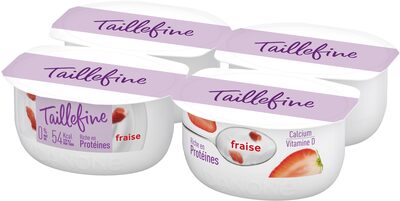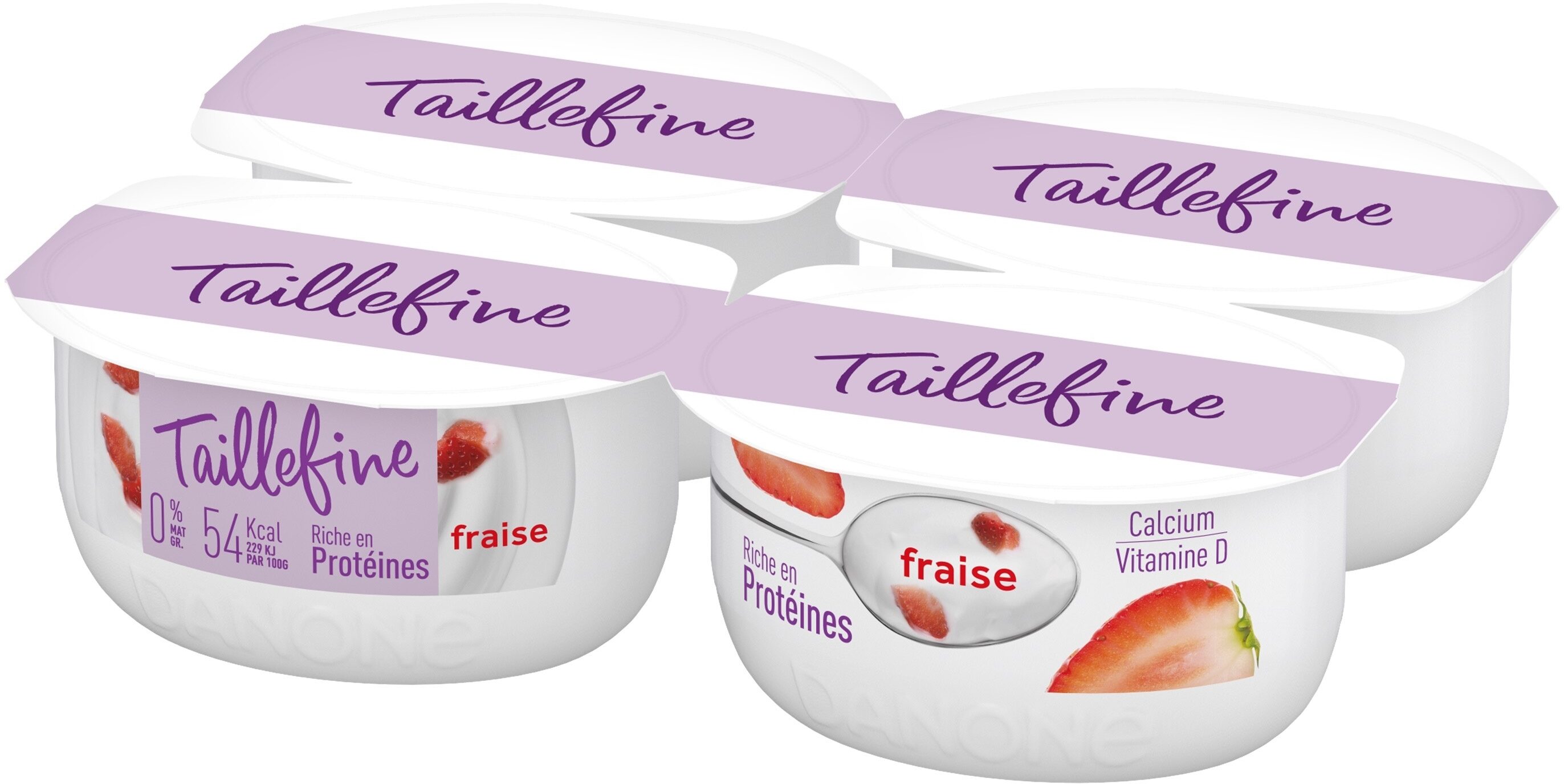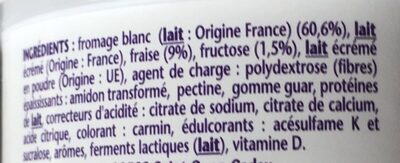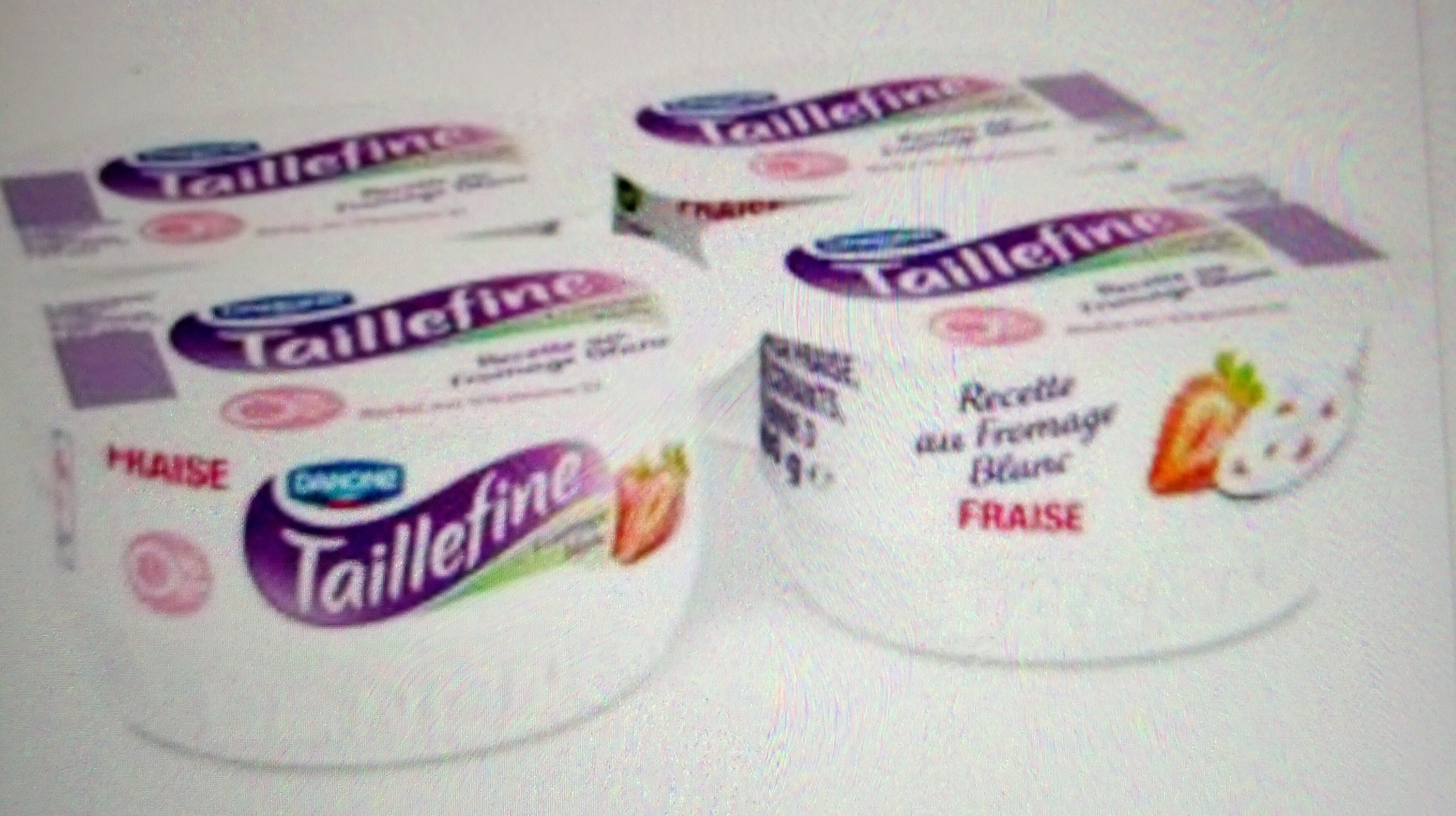Help us make food transparency the norm!
As a non-profit organization, we depend on your donations to continue informing consumers around the world about what they eat.
The food revolution starts with you!
Taillefine recette au fromage blanc fraise 120 g x 4 - 0.48 kg
Taillefine recette au fromage blanc fraise 120 g x 4 - 0.48 kg
Some of the data for this product has been provided directly by the manufacturer DANONE FRANCE.
Barcode: 3033490327866 (EAN / EAN-13)
Common name: Spécialité laitière à la fraise, avec sucre et édulcorants , enrichie en vitamine D
Quantity: 0.48 kg
Brands: Taillefine, Danone, Taillefine fromage
Categories: Dairies, Fermented foods, Fermented milk products, Desserts, Dairy desserts, Fermented dairy desserts, Fermented dairy desserts with fruits, fr:Fromages blancs, fr:Spécialités laitières, fr:Spécialités laitières aux fruits
Labels, certifications, awards: Low or no fat, No added fat, With sweeteners
Origin of ingredients: France
Link to the product page on the official site of the producer: https://www.danone.fr/nos-produits-laiti...
Stores: Carrefour market
Countries where sold: France
Matching with your preferences
Health
Ingredients
-
35 ingredients
French: Fromage blanc (LAIT) 60,6%, LAIT écrémé, fraise 9%, fructose 1,5%, LAIT écremé en poudre, agent de charge: polydextrose (fibres) (E1200), épaississants: amidon transformé (E1422), pectine (E 440), gomme guar ( E 412), protéines de LAIT, correcteurs d'acidité: citrate de sodium (E331), citrate de calcium (E333), acide citrique (E330), colorant: carmin (E120), édulcorants: acésulfame K (E950) et sucralose (E955), arômes, ferments lactiques (LAIT), vitamine DAllergens: Milk
Food processing
-
Ultra processed foods
Elements that indicate the product is in the 4 - Ultra processed food and drink products group:
- Additive: E120 - Cochineal
- Additive: E1422 - Acetylated distarch adipate
- Additive: E14XX - Modified Starch
- Additive: E412 - Guar gum
- Additive: E440 - Pectins
- Additive: E950 - Acesulfame k
- Additive: E955 - Sucralose
- Ingredient: Bulking agent
- Ingredient: Colour
- Ingredient: Flavouring
- Ingredient: Milk proteins
- Ingredient: Sweetener
- Ingredient: Thickener
Food products are classified into 4 groups according to their degree of processing:
- Unprocessed or minimally processed foods
- Processed culinary ingredients
- Processed foods
- Ultra processed foods
The determination of the group is based on the category of the product and on the ingredients it contains.
Additives
-
E120 - Cochineal
Carminic acid: Carminic acid -C22H20O13- is a red glucosidal hydroxyanthrapurin that occurs naturally in some scale insects, such as the cochineal, Armenian cochineal, and Polish cochineal. The insects produce the acid as a deterrent to predators. An aluminum salt of carminic acid is the coloring agent in carmine. Synonyms are C.I. 75470 and C.I. Natural Red 4. The chemical structure of carminic acid consists of a core anthraquinone structure linked to a glucose sugar unit. Carminic acid was first synthesized in the laboratory by organic chemists in 1991.Source: Wikipedia
-
E1200 - Polydextrose
Polydextrose: Polydextrose is a synthetic polymer of glucose. It is a food ingredient classified as soluble fiber by the U.S. Food and Drug Administration -FDA- as well as Health Canada, as of April 2013. It is frequently used to increase the dietary fiber content of food, to replace sugar, and to reduce calories and fat content. It is a multi-purpose food ingredient synthesized from dextrose -glucose-, plus about 10 percent sorbitol and 1 percent citric acid. Its E number is E1200. The FDA approved it in 1981. It is 0.1 times as sweet as sugar.Source: Wikipedia
-
E1422 - Acetylated distarch adipate
Acetylated distarch adipate: Acetylated distarch adipate -E1422-, is a starch that is treated with acetic anhydride and adipic acid anhydride to resist high temperatures. It is used in foods as a bulking agent, stabilizer and a thickener. No acceptable daily intake for human consumption has been determined.Source: Wikipedia
-
E330 - Citric acid
Citric acid is a natural organic acid found in citrus fruits such as lemons, oranges, and limes.
It is widely used in the food industry as a flavor enhancer, acidulant, and preservative due to its tart and refreshing taste.
Citric acid is safe for consumption when used in moderation and is considered a generally recognized as safe (GRAS) food additive by regulatory agencies worldwide.
-
E331 - Sodium citrates
Sodium citrate: Sodium citrate may refer to any of the sodium salts of citrate -though most commonly the third-: Monosodium citrate Disodium citrate Trisodium citrateThe three forms of the salt are collectively known by the E number E331. Sodium citrates are used as acidity regulators in food and drinks, and also as emulsifiers for oils. They enable cheeses to melt without becoming greasy.Source: Wikipedia
-
E333 - Calcium citrates
Calcium citrate: Calcium citrate is the calcium salt of citric acid. It is commonly used as a food additive -E333-, usually as a preservative, but sometimes for flavor. In this sense, it is similar to sodium citrate. Calcium citrate is also found in some dietary calcium supplements -e.g. Citracal-. Calcium makes up 24.1% of calcium citrate -anhydrous- and 21.1% of calcium citrate -tetrahydrate- by mass. The tetrahydrate occurs in nature as the mineral Earlandite.Source: Wikipedia
-
E412 - Guar gum
Guar gum (E412) is a natural food additive derived from guar beans.
This white, odorless powder is valued for its remarkable thickening and stabilizing properties, making it a common ingredient in various food products, including sauces, dressings, and ice creams.
When used in moderation, guar gum is considered safe for consumption, with no known adverse health effects.
-
E440 - Pectins
Pectins (E440) are natural carbohydrates, predominantly found in fruits, that act as gelling agents in the food industry, creating the desirable jelly-like texture in jams, jellies, and marmalades.
Pectins stabilize and thicken various food products, such as desserts, confectioneries, and beverages, ensuring a uniform consistency and quality.
Recognized as safe by various health authorities, pectins have been widely used without notable adverse effects when consumed in typical dietary amounts.
-
E950 - Acesulfame k
Acesulfame potassium: Acesulfame potassium - AY-see-SUL-faym-, also known as acesulfame K -K is the symbol for potassium- or Ace K, is a calorie-free sugar substitute -artificial sweetener- often marketed under the trade names Sunett and Sweet One. In the European Union, it is known under the E number -additive code- E950. It was discovered accidentally in 1967 by German chemist Karl Clauss at Hoechst AG -now Nutrinova-. In chemical structure, acesulfame potassium is the potassium salt of 6-methyl-1‚2,3-oxathiazine-4-3H--one 2‚2-dioxide. It is a white crystalline powder with molecular formula C4H4KNO4S and a molecular weight of 201.24 g/mol.Source: Wikipedia
-
E955 - Sucralose
Sucralose: Sucralose is an artificial sweetener and sugar substitute. The majority of ingested sucralose is not broken down by the body, so it is noncaloric. In the European Union, it is also known under the E number E955. It is produced by chlorination of sucrose. Sucralose is about 320 to 1‚000 times sweeter than sucrose, three times as sweet as both aspartame and acesulfame potassium, and twice as sweet as sodium saccharin. Evidence of benefit is lacking for long-term weight loss with some data supporting weight gain and heart disease risks.It is stable under heat and over a broad range of pH conditions. Therefore, it can be used in baking or in products that require a long shelf life. The commercial success of sucralose-based products stems from its favorable comparison to other low-calorie sweeteners in terms of taste, stability, and safety. Common brand names of sucralose-based sweeteners are Splenda, Zerocal, Sukrana, SucraPlus, Candys, Cukren, and Nevella. Canderel Yellow also contains sucralose, but the original Canderel and Green Canderel do not.Source: Wikipedia
Ingredients analysis
-
Palm oil free
No ingredients containing palm oil detected
-
Non-vegan
Non-vegan ingredients: Fromage blanc, Skimmed milk, Skimmed milk powder, Milk proteins, E120, E120
-
Non-vegetarian
Non-vegetarian ingredients: E120, E120
-
Details of the analysis of the ingredients
fr: Fromage blanc 60.6%, LAIT écrémé, fraise 9%, fructose 1.5%, LAIT écremé en poudre, agent de charge (polydextrose (fibres, e1200)), épaississants (amidon transformé (e1422)), pectine (e440), gomme guar (e412), protéines de LAIT, correcteurs d'acidité (citrate de sodium (e331)), citrate de calcium (e333), acide citrique (e330), colorant (carmin (e120)), édulcorants (acésulfame K (e950)), sucralose (e955), arômes, ferments lactiques, vitamine D- Fromage blanc -> en:fromage-blanc - vegan: no - vegetarian: maybe - ciqual_food_code: 19501 - percent_min: 60.6 - percent: 60.6 - percent_max: 60.6
- LAIT écrémé -> en:skimmed-milk - vegan: no - vegetarian: yes - ciqual_proxy_food_code: 19051 - percent_min: 9 - percent_max: 28.9
- fraise -> en:strawberry - vegan: yes - vegetarian: yes - ciqual_food_code: 13014 - percent_min: 9 - percent: 9 - percent_max: 9
- fructose -> en:fructose - vegan: yes - vegetarian: yes - ciqual_food_code: 31077 - percent_min: 1.5 - percent: 1.5 - percent_max: 1.5
- LAIT écremé en poudre -> en:skimmed-milk-powder - vegan: no - vegetarian: yes - ciqual_food_code: 19054 - percent_min: 0 - percent_max: 1.5
- agent de charge -> en:bulking-agent - percent_min: 0 - percent_max: 1.5
- polydextrose -> en:e1200 - vegan: yes - vegetarian: yes - percent_min: 0 - percent_max: 1.5
- fibres -> en:fiber - percent_min: 0 - percent_max: 1.5
- e1200 -> en:e1200 - vegan: yes - vegetarian: yes - percent_min: 0 - percent_max: 0.75
- polydextrose -> en:e1200 - vegan: yes - vegetarian: yes - percent_min: 0 - percent_max: 1.5
- épaississants -> en:thickener - percent_min: 0 - percent_max: 1.5
- amidon transformé -> en:modified-starch - vegan: yes - vegetarian: yes - ciqual_proxy_food_code: 9510 - percent_min: 0 - percent_max: 1.5
- e1422 -> en:e1422 - vegan: yes - vegetarian: yes - percent_min: 0 - percent_max: 1.5
- amidon transformé -> en:modified-starch - vegan: yes - vegetarian: yes - ciqual_proxy_food_code: 9510 - percent_min: 0 - percent_max: 1.5
- pectine -> en:e440a - vegan: yes - vegetarian: yes - percent_min: 0 - percent_max: 1.5
- e440 -> en:e440a - vegan: yes - vegetarian: yes - percent_min: 0 - percent_max: 1.5
- gomme guar -> en:e412 - vegan: yes - vegetarian: yes - percent_min: 0 - percent_max: 1.5
- e412 -> en:e412 - vegan: yes - vegetarian: yes - percent_min: 0 - percent_max: 1.5
- protéines de LAIT -> en:milk-proteins - vegan: no - vegetarian: yes - percent_min: 0 - percent_max: 1.5
- correcteurs d'acidité -> en:acidity-regulator - percent_min: 0 - percent_max: 1.5
- citrate de sodium -> en:sodium-citrate - percent_min: 0 - percent_max: 1.5
- e331 -> en:e331 - vegan: yes - vegetarian: yes - percent_min: 0 - percent_max: 1.5
- citrate de sodium -> en:sodium-citrate - percent_min: 0 - percent_max: 1.5
- citrate de calcium -> en:e333 - vegan: yes - vegetarian: yes - percent_min: 0 - percent_max: 1.5
- e333 -> en:e333 - vegan: yes - vegetarian: yes - percent_min: 0 - percent_max: 1.5
- acide citrique -> en:e330 - vegan: yes - vegetarian: yes - percent_min: 0 - percent_max: 1.5
- e330 -> en:e330 - vegan: yes - vegetarian: yes - percent_min: 0 - percent_max: 1.5
- colorant -> en:colour - percent_min: 0 - percent_max: 1.5
- carmin -> en:e120 - vegan: no - vegetarian: no - percent_min: 0 - percent_max: 1.5
- e120 -> en:e120 - vegan: no - vegetarian: no - percent_min: 0 - percent_max: 1.5
- carmin -> en:e120 - vegan: no - vegetarian: no - percent_min: 0 - percent_max: 1.5
- édulcorants -> en:sweetener - percent_min: 0 - percent_max: 1.5
- acésulfame K -> en:e950 - vegan: yes - vegetarian: yes - percent_min: 0 - percent_max: 1.5
- e950 -> en:e950 - vegan: yes - vegetarian: yes - percent_min: 0 - percent_max: 1.5
- acésulfame K -> en:e950 - vegan: yes - vegetarian: yes - percent_min: 0 - percent_max: 1.5
- sucralose -> en:e955 - vegan: yes - vegetarian: yes - percent_min: 0 - percent_max: 1.5
- e955 -> en:e955 - vegan: yes - vegetarian: yes - percent_min: 0 - percent_max: 1.5
- arômes -> en:flavouring - vegan: maybe - vegetarian: maybe - percent_min: 0 - percent_max: 1.5
- ferments lactiques -> en:lactic-ferments - vegan: maybe - vegetarian: yes - percent_min: 0 - percent_max: 1.5
- vitamine D -> en:vitamin-d - percent_min: 0 - percent_max: 1.5
Nutrition
-
Very good nutritional quality
⚠ ️Warning: the amount of fiber is not specified, their possible positive contribution to the grade could not be taken into account.⚠ ️Warning: the amount of fruits, vegetables and nuts is not specified on the label, it was estimated from the list of ingredients: 9This product is not considered a beverage for the calculation of the Nutri-Score.
Positive points: 3
- Proteins: 3 / 5 (value: 6.4, rounded value: 6.4)
- Fiber: 0 / 5 (value: 0, rounded value: 0)
- Fruits, vegetables, nuts, and colza/walnut/olive oils: 0 / 5 (value: 9, rounded value: 9)
Negative points: 1
- Energy: 0 / 10 (value: 229, rounded value: 229)
- Sugars: 1 / 10 (value: 6.2, rounded value: 6.2)
- Saturated fat: 0 / 10 (value: 0.06, rounded value: 0.1)
- Sodium: 0 / 10 (value: 60, rounded value: 60)
The points for proteins are counted because the negative points are less than 11.
Nutritional score: (1 - 3)
Nutri-Score:
-
Nutrient levels
-
Fat in low quantity (0.1%)
What you need to know- A high consumption of fat, especially saturated fats, can raise cholesterol, which increases the risk of heart diseases.
Recommendation: Limit the consumption of fat and saturated fat- Choose products with lower fat and saturated fat content.
-
Saturated fat in low quantity (0.06%)
What you need to know- A high consumption of fat, especially saturated fats, can raise cholesterol, which increases the risk of heart diseases.
Recommendation: Limit the consumption of fat and saturated fat- Choose products with lower fat and saturated fat content.
-
Sugars in moderate quantity (6.2%)
What you need to know- A high consumption of sugar can cause weight gain and tooth decay. It also augments the risk of type 2 diabetes and cardio-vascular diseases.
Recommendation: Limit the consumption of sugar and sugary drinks- Sugary drinks (such as sodas, fruit beverages, and fruit juices and nectars) should be limited as much as possible (no more than 1 glass a day).
- Choose products with lower sugar content and reduce the consumption of products with added sugars.
-
Salt in low quantity (0.15%)
What you need to know- A high consumption of salt (or sodium) can cause raised blood pressure, which can increase the risk of heart disease and stroke.
- Many people who have high blood pressure do not know it, as there are often no symptoms.
- Most people consume too much salt (on average 9 to 12 grams per day), around twice the recommended maximum level of intake.
Recommendation: Limit the consumption of salt and salted food- Reduce the quantity of salt used when cooking, and don't salt again at the table.
- Limit the consumption of salty snacks and choose products with lower salt content.
-
-
Nutrition facts
Nutrition facts As sold
for 100 g / 100 mlAs sold
per serving (120 g (POT))Compared to: fr:Spécialités laitières aux fruits Energy 229 kj
(54 kcal)275 kj
(64 kcal)-45% Fat 0.1 g 0.12 g -97% Saturated fat 0.06 g 0.072 g -98% Carbohydrates 6.5 g 7.8 g -41% Sugars 6.2 g 7.44 g -39% Fiber ? ? Proteins 6.4 g 7.68 g +39% Salt 0.15 g 0.18 g +27% Vitamin D 1.5 µg 1.8 µg +7% Calcium 120 mg 144 mg -1% Fruits‚ vegetables‚ nuts and rapeseed‚ walnut and olive oils (estimate from ingredients list analysis) 9 % 9 %
Environment
-
Eco-Score B - Low environmental impact
⚠ ️Select a country in order to include the full impact of transportation.The Eco-Score is an experimental score that summarizes the environmental impacts of food products.→ The Eco-Score was initially developped for France and it is being extended to other European countries. The Eco-Score formula is subject to change as it is regularly improved to make it more precise and better suited to each country.Life cycle analysis
-
Average impact of products of the same category: A (Score: 91/100)
Category: Fresh cream cheese, plain, around 3% fat
Category: Fresh cream cheese, plain, around 3% fat
- PEF environmental score: 0.19 (the lower the score, the lower the impact)
- including impact on climate change: 1.84 kg CO2 eq/kg of product
Stage Impact Agriculture
64.0 %Processing
14.6 %Packaging
7.9 %Transportation
7.5 %Distribution
4.7 %Consumption
1.3 %
Bonuses and maluses
-
Origins of ingredients with a medium impact
Bonus: +4
Environmental policy: +4
Transportation: 0
Origin of the product and/or its ingredients % of ingredients Impact France 100 %Medium
-
Packaging with a high impact
Malus: -15
Shape Material Recycling Impact Pot Plastic Discard High 4 Seal Plastic Discard High Unknown Plastic Discard High Unknown Unknown High ⚠ ️ The information about the packaging of this product is not sufficiently precise (exact shapes and materials of all components of the packaging).⚠ ️ For a more precise calculation of the Eco-Score, you can modify the product page and add them.
If you are the manufacturer of this product, you can send us the information with our free platform for producers.
Eco-Score for this product
-
Impact for this product: B (Score: 79/100)
Product: Taillefine recette au fromage blanc fraise 120 g x 4 - 0.48 kg
Life cycle analysis score: 91
Sum of bonuses and maluses: -11
Final score: 79/100 (The score of products with non-recyclable and non-biodegradable packaging materials is capped at 79 (grade B).)
-
Carbon footprint
-
Equal to driving 1.0 km in a petrol car
184 g CO² per 100g of product
The carbon emission figure comes from ADEME's Agribalyse database, for the category: Fresh cream cheese, plain, around 3% fat (Source: ADEME Agribalyse Database)
Stage Impact Agriculture
70.8 %Processing
7.0 %Packaging
9.8 %Transportation
10.0 %Distribution
1.9 %Consumption
0.4 %
Packaging
-
Packaging with a high impact
-
Packaging parts
Pot (Plastic)
4 x Seal (Plastic)
Unknown (Plastic)
Unknown (Unknown)
-
Packaging materials
Material % Packaging weight Packaging weight per 100 g of product Plastic
-
Transportation
-
Origins of ingredients
Origins of ingredients with a medium impact
Origin of the product and/or its ingredients % of ingredients Impact France 100 %Medium
Other information
Conservation conditions: A conserver entre +1°C et + 6°C maximum
Customer service: D.P.F.F., CS 50149 92565 Rueil-Malmaison Cedex
Report a problem
-
Incomplete or incorrect information?
Category, labels, ingredients, allergens, nutritional information, photos etc.
If the information does not match the information on the packaging, please complete or correct it. Open Food Facts is a collaborative database, and every contribution is useful for all.
Data sources
The manufacturer DANONE FRANCE uses CodeOnline Food to automatically transmit data and photos for its products.
Manufacturers can use the Open Food Facts free plaform for producers to access and complete this data, and to obtain reports, analysis and product improvements opportunities (e.g. better Nutri-Score).
Product added on by openfoodfacts-contributors
Last edit of product page on by org-danone-france.
Product page also edited by autorotate-bot, date-limite-app, desan, didierg, elbarto, fix-serving-size-bot, kakounski, kiliweb, moon-rabbit, nakoaktok, packbot, quentinbrd, sebleouf, tacite-mass-editor, yuka.WGE4dVRLZ3p0OVlCd2ZNWTBrdnpxdHg2NTdLWmQyaVlkK283SUE9PQ, yuka.WS94YkdyOGt2T01QeGNZaHBrL2I4ZHh0bHBTNVIwUHNKL1lOSVE9PQ, yuka.WTRZOE1ZVlpvcU1Hdi8wRDV3encwZndyNTg2emVINnVPY2NJSVE9PQ, yuka.sY2b0xO6T85zoF3NwEKvlmF6VcbApwufFTP6lkqR4dKCJKDRbept_4qrDKs.












